1987: Veronica Cartwright in "The Witches of Eastwick"
 Thursday, October 29, 2020 at 11:00AM
Thursday, October 29, 2020 at 11:00AM
Before each Smackdown, Nick Taylor looks at alternates to the Oscar ballot...
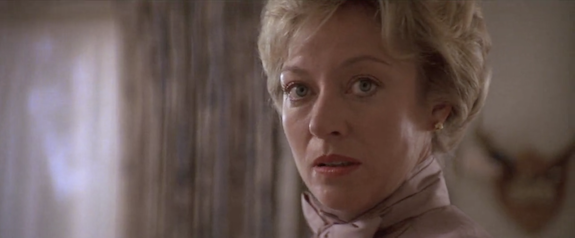
Happy Halloween!! God, I missed writing these pieces. And I’m so excited to finally discuss a horror film performance, even if The Witches of Eastwick isn’t anyone’s first example of "horror". Probably the purest element of horror in the film - and its best element period - is Veronica Cartwright’s unforgettable turn as the devout, unraveling selectwoman Felicia Alden. An actress possessessing an uncanny ability to give plausible, full-bodied expressions of terror to films as frightening and atmospherically rich as Invasion of the Body Snatchers and Alien, her gifts are put to the test in an equally ambitious but more tonally inconsistent film. Felicia surely ranks among the most showcased roles she’s ever had, which is all the more exciting given how different she is from Lambert, though I can’t fathom why her career didn't explode with juicy offers thereafter. Regardless, what she accomplishes here might be the crown jewel of her vivid, horror-cult career...
The one caveat I have, which has more to do with Michael Cristofer’s script (or maybe John Updike’s novel) than Cartwright’s performance, is that Felicia herself doesn’t feel as well-integrated into the narrative as she might. Why is it that her only interaction with the leads is a quick “Hi!” to Pfeiffer, and that we only see her in proximity to any of them in the first twenty-five minutes? Scenes like Sarandon being scorned at the grocery store by every old biddy in Eastwick would arguably be more effective for Felicia being there to provide the half-remembered townspeople some real venom and give Sarandon a more established presence to play against instead of a bunch of extras. Maybe it’s too much to dream about a version that explored her “visions” in more detail, but I don’t think wanting to see Veronica Cartwright act opposite more of her castmates is too much to ask for.
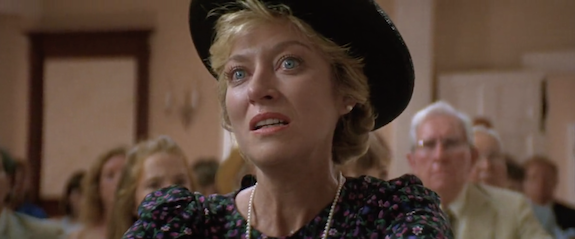
But even if Cartwright is somewhat cordoned off from the main action of The Witches of Eastwick, she’s also the most potent, staggering performer in the film, somehow gaining layers as Felicia becomes more of a spectacle. A big reason for this is how Cartwright establishes Felicia with a concrete sense of her personality while leaving room for her to escalate. After being introduced singing “America the Beautiful” at whatever town ceremony caps off the prologue (sidenote: is that her real voice?), Felicia gets her first real scene at her husband Clyde’s (a quietly great Richard Jenkins) newspaper. She swans through the room, happily chatting with aides until she hears Sukie (Pfeiffer) inform Clyde that someone bought the Lenox mansion, a development that shakes her so foundationally she gasps and drops a vase of flowers and a jar of honey onto the floor, turning back at Sukie with terror but also plenty of steel. Conversing with Clyde in his office, Felicia is upset at the desecration of Eastwick’s heritage and put off by her husband’s meek willingness to allow it. More than that, she’s absolutely certain that whoever owns the house has brought something evil with them to her little town.
I’ve credited actresses in these write-ups for adding dimension to potentially shallow roles, eschewing flat unlikability in favor of complicated characterization. Cartwright and director George Miller accomplish a version of this while fully embracing Felicia’s vituperative qualities - amassing a real sense of domesticity with Clyde that’s visibly tinged with contempt, showing her refined distaste for a man snoring throughout a concert and offhand dismissal of his dumb name. Yet all of this plays in a totally human key. Her religious devotion, premonitions of danger, and increasingly unhinged behavior are handled with more nuance and implication than Stephen King's version of this character would allow for. She’s an oppositional force, but Cartwright commits to making Felicia an essentially normal if not altogether appealing person experiencing some hideous vibes rather than a full-on villain. You can see why Eastwick would hold her in such high esteem as well as how fully she earns it, how much the idea of her town being taken over by some horrible force genuinely upsets her.
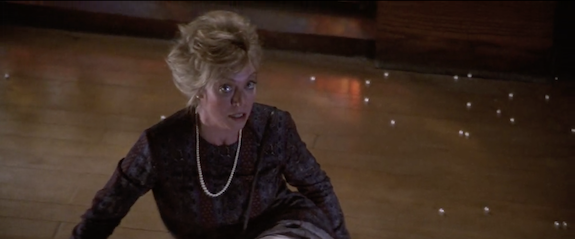
Tragically, things take a sour turn for Felicia Alden pretty quick. She attends an orchestra concert with the whole town in attendance, including the priggish man who bought the Lennox House. After it ends, she and everyone else suddenly remember his name, and she mocks it just in time to magically trip down a flight of stairs. I love the juxtaposition of her eternally lucid manner of speaking and the childlike fear in her eyes, as she looks up from the floor and says “Oh Clyde honey, I think I broke my leg” after taking a moment to process the bone protruding from her ankle.
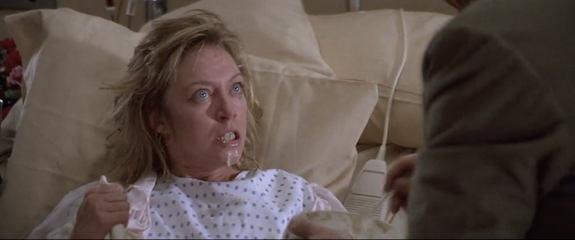
Clyde takes her to the hospital, and the next time we see her she’s got her leg in a cast and he's feeding her oatmeal. Apropos of nothing she begins to hum out insults against Clyde, his morality, his job, growing more enraged as she spits out her hatred of Darryl Van Horne and the last of her dinner before howling in pain. Felicia’s nurse tries to soothe Clyde by telling him that her paranoid ravings are symptomatic of a complication with her leg surgery, but he, like the audience, cannot quite believe this can be explained away so easily. Especially after she says something evil is crawling inside her. As Felicia herself sums it up, “I open my mouth, the strangest things come out”.
Here lies one of the two key, ingenious facets of Cartwright’s performance: a refusal to pin down what exactly is wrong with Felicia. You can imagine another version of this performance that specifies what has driven her to these ever-more deranged declarations of perversion and devilry - genuine clairvoyance, mental disruption, demon or angelic intervention. Cartwright instead emphasizes the sheer conviction behind what Felicia is saying, making her a Cassandra whose prophecies are ignored because of the bilious spectacle she’s warped into. Sure, the citizens of Eastwick listen long enough to shun the witches, but they hardly seem to know what to do with her otherwise. Clyde barely recognizes her as his wife, yet Cartwright is so rooted in the glimpses of Felicia we saw at the beginning that we can’t say she’s become a different person entirely. Jenkins’ performance, sliding from baffled attempts at pacification to disgust and genuine loss, also provides a firm anchor to keep her from ballooning off.
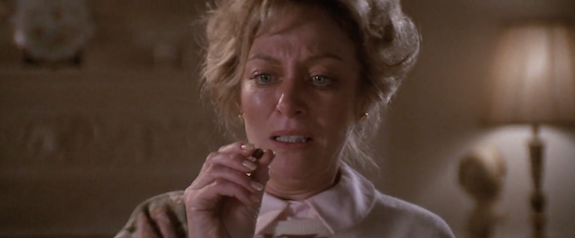
The other key success is Cartwright’s outrageous physical commitment, using her face and body to visceral effect, as though the intensity of what she’s feelings powers her every step and expression. I don’t mean to say she’s going full-bore all the time. Cartwright shows us glimpses of Felicia quietly simmering in her own head, thinking about whatever's bothering her before she starts speaking her truth. In her big scenes, screeching inside said church or talking to herself at home, Cartwright ups the scale of these gestures while investing them with just as much feeling. Her eyes bulge out of her head, her body darts from place to place, her arms clawing and reaching for someone or something to latch onto and share her words with. Even here, Cartwright modulates the rhythms of her outbursts, making her moment-to-moment choices all the more unsettling for being completely unpredictable. I feel remiss not to mention how funny Cartwright often is in these scenes, but it’s a black, throat-catching comedy, equally premised on her breaking of social norms and the insane, outsized force behind what she’s saying and doing. Yes, it’s hilarious to hear the town matriach scream about anal intercourse in church to a blank-faced parish while her husband hauls her out of the building, but you worry for Felicia as she begs them to listen to her.
Has she actually lost her mind? Or, as it turns out in her final, most unsettling scene, is she right about everything, and is desperate to use whatever ghoulish force has possessed her to try and stop this malignancy? I have no idea how to describe her last scene, a horrific epiphany that viciously culminates her increasing mania and Clyde’s terrified bystanderdom. Even as she’s aided by some monstrous sound effects and a lot of fruit, Cartwright achieves a horrifying apotheosis of physical intensity and psychological clarity without once looking like she’s showboating or solely relying on Miller to be scary. It’s also an astonishing catalogue of what constitutes brave, risking-taking actressing in a major studio release: to look disgusting, to relay ugly emotions in an unbecoming and terrifying way, to craft a full character rather than coast on persona. She's not just the gutsiest, most balls-out asset in The Witches of Eastwick, she winds up highlighting its timidness elsewhere, even as her exit feels like the moment the film really ups its game. It's a star turn in the most fearless sense, and one I can't wait to celebrate on future Halloweens.
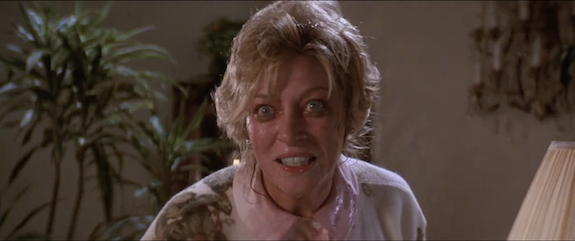



Reader Comments (20)
I love her so much. It almost hurts that she doesn't have an Oscar nomination to her credit.
I wish we could send this wonderful dedicated piece to Victoria Nick - incredibly talented I always felt she was underrated. Always love to see her she adds a different dimension.
Not a fan of this film, but I remember Cartwright being the best part of it. She took a stock character-- sanctimonious church lady-- and made her a real person. You can feel how scared she is at what's happening in her head. I came out of this film thinking she should have been the hero of the story, which I don't think is what was intended.
Easily would've nominated her that year. She's the most visceral and primal thing about the film, which I love (though the book, to no one's surprise, is better).
Each of her scenes hits a different beat of the character, while still maintaining cohesion in the narrative and her arc. That's Cartwright through and through, and a supreme embodiment of what a supporting actress can accomplish on the fringes and right smack in the center of a narrative.
She's definitely not just the cherry on top!
This writeup was glorious to read especially being a fan of Cartwright and her particular skill as a performer. She's been a brilliant and unique performer since she really stole the scene in 1961's Children's Hour playing the innocent Rosalie. She was such a confident child performer that she has/had transitioned so well into an adult performer.
She is really great in Aliens and Eastwick as you discuss in your piece. I'd easily nominate her for each of those projects. Seriously it's incredible how with her face made for motion pictures that she is just as solid a performer physically with her body as with her highly expressive face. It is the work by Veronica that really sells the terror the audience feels towards the creature in the first Alien movie.
I do wish like many of my favourite character actors that she had opportunities on top of opportunities in her career to give great performances but I will take her stand out work over many actors who are somehow considered bigger stars yet have never risen to the height of her.
By far my favorite performance in the film. Nice appreciation of it.
I was thinking about her in "The Children's Hour". She's amazing in her breakdown scene even if Rosalie is less showy part than Mary. "...Eastwick" was a disappointing movie but Cartwright was shining the brightest which is quite an achievement given that cast. I wonder if she would have had Sigourney Weaver's career if she was cast as Ripley because apparently it almost happened.
TheDrMistery - I agree with you that Mary is the showier part but I believe that in both filmed version's I've seen that it's the actress playing Rosalie who gives the greater performance. (These Three in 1936 in the previous version of the play and Marcia Mae Jones who plays Rosalie is excellent, even better than Bonita Granville who got the oscar nomination)
This certainly brought out the VC love,an excellent pick and write up,check out Veronica in the 75 movie Inserts as a heroin addicted flapper girl,my first of 3 nominations for her would have started right there.
I don't know if people know this but the cherry spewing scene was edited down,some of the footage of the anamatronic Felicia didn't work or looked wrong and there was a rating problem also so cuts were made.
LOVE LOVE LOVE this performance (and this movie).
I worked at a theater when this was out. We would all be casually eating cherries as people walked out of the theater when the film ended.
Side note: great stories about the making of this on the recent Polly Platt series on Karina Longworth's podcast You Must Remember This. (the balloons!!)
I remember the great article on Veronica Cartwright in this movie from that brilliant supporting acting column Take Three from several years ago.
Love Veronica Cartwright. She's been superb in everything I've ever seen her in (including young Cathy in Hitchcock's classic, The Birds). Great piece, Nick!
Veronica Cartwright... a severely underrated actress.
It's hilarious to me The Birds set the tone for her career as a perpetual weepy presence in the movies.
Fun Fact: There's a rumor, one that's made it into print a couple of times, that Pauline Kael was so over-the-top hot for Cartwright hat they assumed she was falling in love with the actress. In the Brian Kellow biography of Kael, Cartwright says Kael, who had lavished praise on her in multiple reviews, asked her to a movie one night, and when she said no, Kael looked startlingly disappointed. She never mentioned her in print again.
She and her character deserved their own movie!
Leaps and bounds more worthy a nominee than all of Olympia's competition
"The Witches of Eastwick" is a fun movie in just about every respect, except for Veronica Cartwright's scenes. I'm crazy about this actress (no one's better when it comes to creating audience empathy), but her role makes no sense, and I kept wondering why Cartwright had to endure the repulsive series of embarrassments. It would be one thing if her character were a comically heinous bitch or a villainess you love to hate, so that you'd have fun seeing her comeuppance. But her character is neither one of those things, so I watched her scenes uncomfortably, seeing her get humiliated over and over again. I wish those jarringly ugly scenes had been left on the cutting-room floor.
Cartwright is extraordinary in The Witches of Eastwick, and in many, many other films already named (not to mention Will & Grace). Her initial appearance, dramatically dropping the jar and vase, is arresting, and it just gets wilder (and, I might add, more tragic) from there. (Her shouting "whores!" in church also may be the very first time I heard "Spanish flies, dildos, anal intercourse" in my life, LOL.)
George Miller is a genius filmmaker, by the way.